Every Vote Matters
Mr. Vice President, Mr. Speaker, members of the Senate and the House of Representatives: Yesterday, December 7th, 1941—a date which will live in infamy—the United States of America was suddenly and deliberately attacked by naval and air forces of the Empire of Japan.
—Franklin Delano Roosevelt, 32nd President of the United States, in a speech delivered before a Joint Session of Congress at 12:30 p.m. on December 8, 1941—
“An entire generation of Americans,” writes best-selling author and William J. Bennett, “would remember where they were when they heard the shocking news of [the Japanese attack on] Pearl Harbor.” Although the number of individuals who can recall hearing about this event as fresh news is dwindling every day, perhaps you yourself remember, or you know someone who does.

President Franklin Roosevelt delivered an important speech the day following the attack. His speech lasted only seven minutes, but it had a powerful and long-term impact on the American psyche and on American cultural and political life. You can hear a recording of the entire speech here. Congress declared war on Japan just 33 minutes after the speech ended, with only one dissenting vote cast. Radios in 81 percent of American homes were tuned to the president’s remarks during the live broadcast.
Listen to President Franklin Delano Roosevelt’s “Day of Infamy” Speech in its entirety here.
Yet, even among those who were alive at the time, probably only a few came to know that the president himself made significant and important changes to the speech, including its opening words. A draft of Roosevelt’s remarks originally stated that “the United States of America was simultaneously and deliberately attacked by naval and air forces of the Empire of Japan.” Roosevelt crossed out the word simultaneously and above it penciled in suddenly.
Here’s a change that was even more crucial. The draft began by citing “Yesterday, December 7, 1941,” as “a date which will live in world history.” This was not exactly the idea the president wanted to convey, so he marked through world history and replaced it with infamy.

Something else few American’s would realize is “how perilous was the condition of America’s armed forces. Our army ranked in size below that of Romania,” writes William Bennett. “Our navy had just been dealt a near-fatal blow. Providentially, however, the U.S. aircraft carrier fleet was out to sea when Pearl Harbor was struck.”
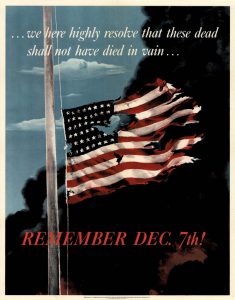
What else had been providential? Perhaps a great many things, despite the devastation and loss of life that the Japanese attack had inflicted on the American naval base in Hawaii. Consider this: Just a little over a year earlier, on September 16, 1940, the first peacetime military conscription in U.S. history was enacted. The Selective Training and Service Act of 1940 established that a military draft that could place in training up to 900,000 men for up to 12 months. By the early summer of 1941, President Roosevelt asked Congress to extend the time of service for military draftees beyond the original one-year time frame.
A proposed extension would pass in the U.S. Senate by a larger margin, but on August 12, 1941, the U.S. House of Representatives approved it by a margin of just one vote. The president signed the extension into law on August 18—a mere 111 days before the Japanese attack in the Pacific. Thankfully, America rallied, and the critical “catch-up” efforts in United States Armed Forces took place.
On August 12, 1941, the U.S. House of Representatives approved an extension of the Selective Training and Service Act of 1940 by a margin of just one vote. The president signed the extension into law on August 18—a mere 111 days before the Japanese attack in the Pacific.
War is both tragic and costly, of course; and sincere Christians can debate if, how, and to what extent military force should be used. But consider what could have happened to U.S. military readiness had it not been for the extension that passed in Congress just weeks before December 7. Might it have taken even longer for the U.S. military to play catch-up? We have to see this as a real possibility.
Such is the potential power of one vote.

As Christians, we are citizens of God’s kingdom, and our allegiance to Him is our primary commitment. But as long as we’re here on earth, we are citizens of an earthly kingdom as well, imperfect though it is. In Luke 20:25 Jesus said, “Render therefore unto Caesar the things which be Caesar’s, and unto God the things which be God’s.” We have a duty before God to bring His truth to bear on our earthly citizenship responsibilities. Thus, we take these responsibilities seriously, including the right to vote. In 1 Corinthians 10:31, the apostle Paul wrote, “whatsoever ye do, do all to the glory of God.” (Go here and here.)
As Christians, we have a duty before God to bring His truth to bear on our earthly citizenship responsibilities. Thus, we take these responsibilities seriously, including the responsibility and right to vote.
As Christians, we know that genuine, long term spiritual renewal in our country will not come through a politician or through politics. At the same time, we must acknowledge the truth of what Solomon wrote in Proverbs: “Righteousness exalteth a nation: but sin is a reproach to any people” (Prov. 14:34), and “When the righteous are in authority, the people rejoice: but when the wicked beareth rule, the people mourn” (29:2). In a free country like ours, if the righteous aren’t in authority, it’s at least partly our fault!
This year—2018—is a mid-term election year, and every vote—every single vote—matters. The truth is, it matters in every election!
Be informed. Be involved. Vote intelligently and according to your values—all for the glory of God.
The text of this article, which was written by B. Nathaniel Sullivan, first appeared in the Fall, 2012 issue of Life Words Personal Study Guide, (Nashville: LifeWay Christian Resources, 2012), 7-8. Here it has been updated and reproduced with only minor changes. Used by permission of LifeWay Christian Resources.
Permission from LifeWay Christian Resources for the author to publish this article at www.wordfoundations.com should not be construed as an endorsement of this website by LifeWay.
Sources:
William J. Bennett, America, The Last Best Hope—Volume II: From a World at War to the Triumph of Freedom, (Nashville: Thomas Nelson, 2007), 190-191.
http://en.wikipedia.org/wiki/Infamy_Speech
http://en.wikipedia.org/wiki/Selective_Training_and_Service_Act_of_1940
top image: Pearl Harbor under Japanese attack, December 7, 1941
Contrast the above images to this one of Pearl Harbor on October 30, 1941.
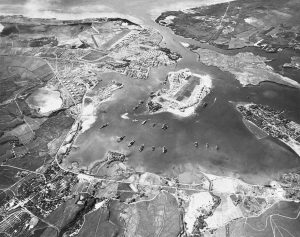
Pearl Harbor on October 30, 1941, looking southwest
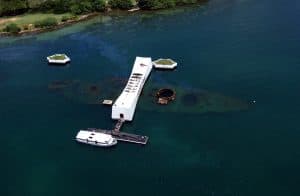 USS Arizona Memorial at Pearl Harbor, Hawaii
USS Arizona Memorial at Pearl Harbor, Hawaii
Wikipedia article about the USS Arizona Memorial
photo credit: Carrier Shōkaku
photo credit: Voting place indicator
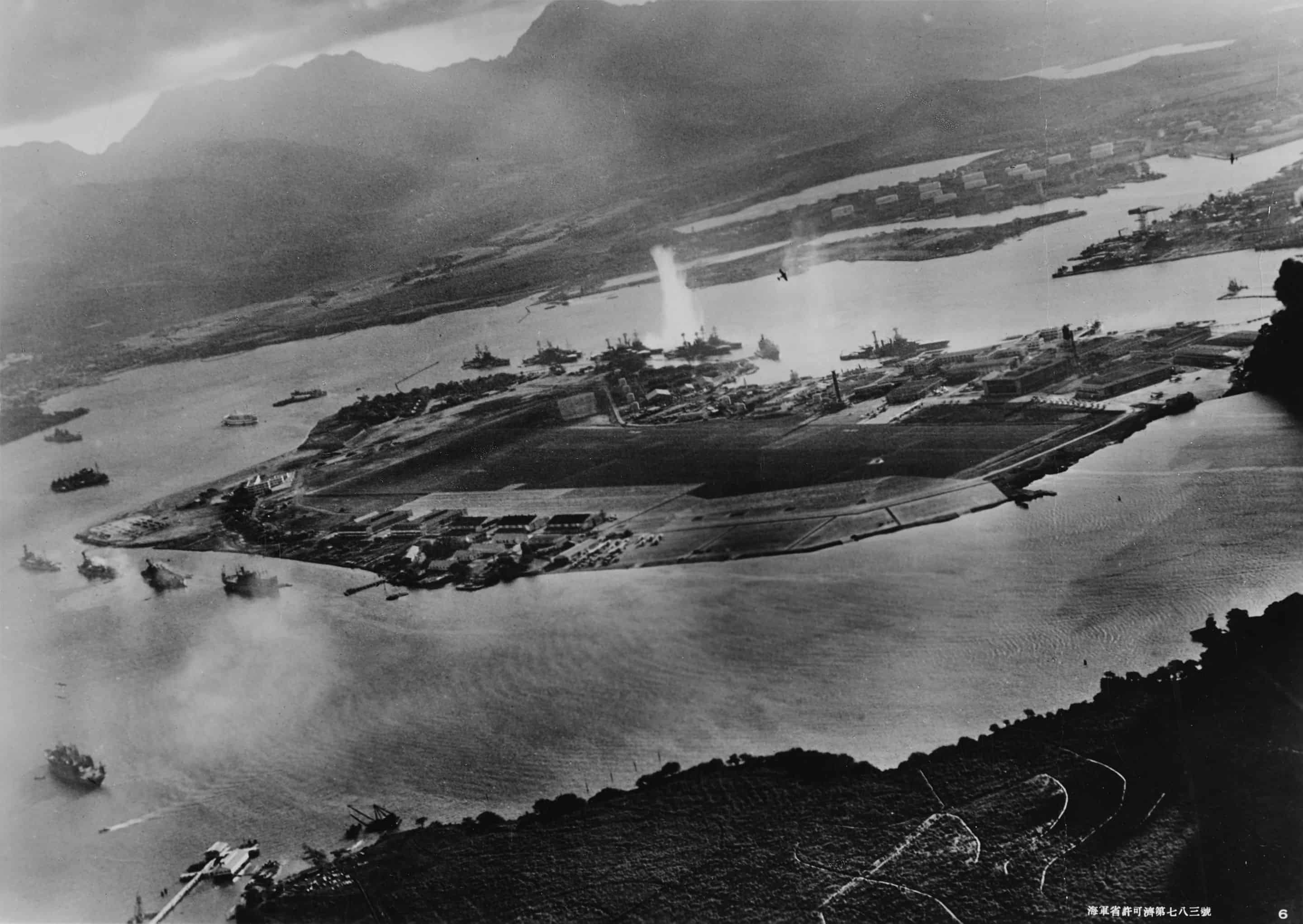
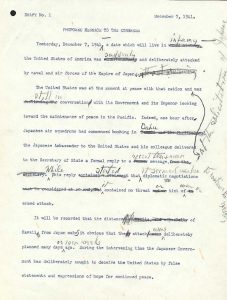
Be First to Comment